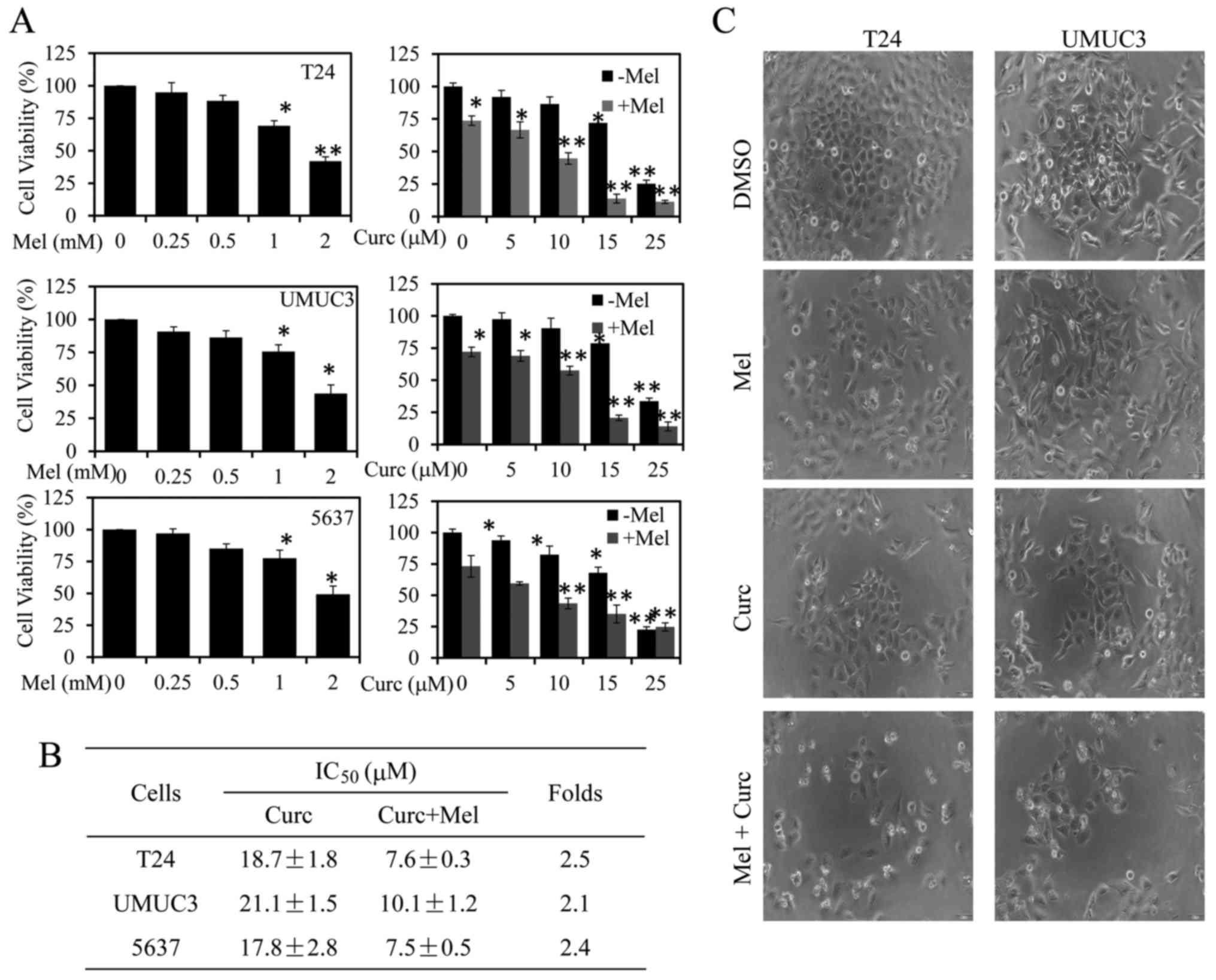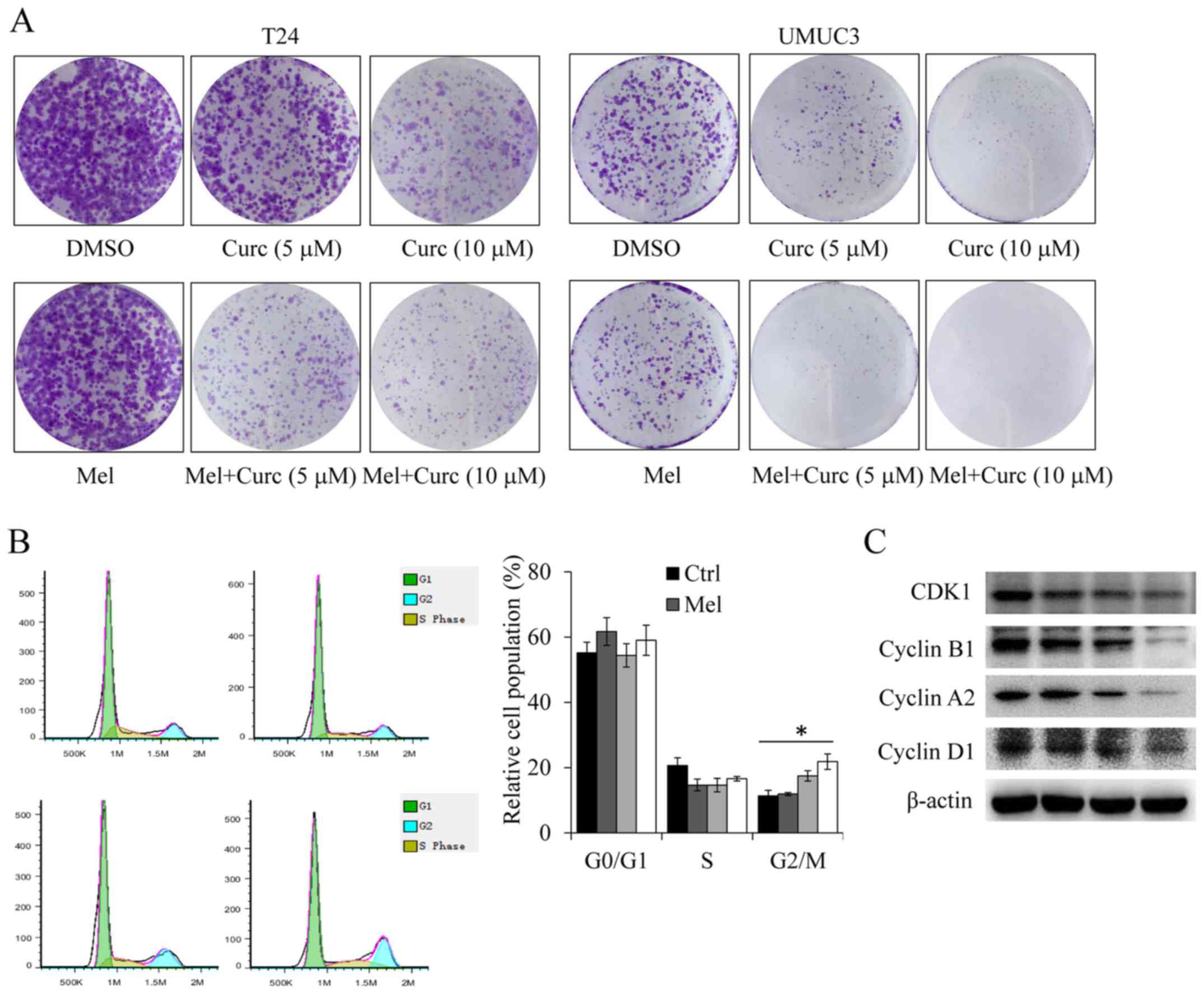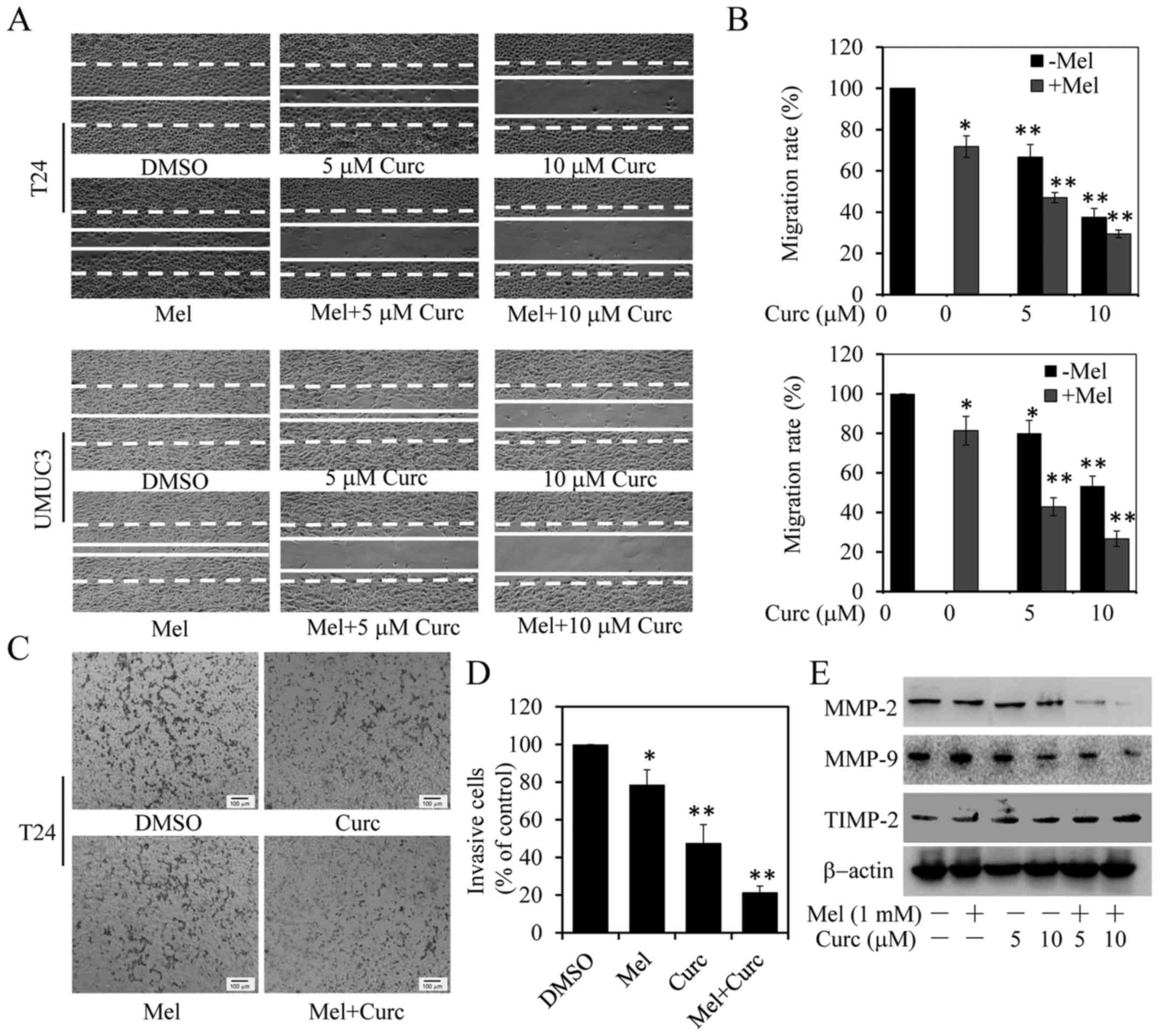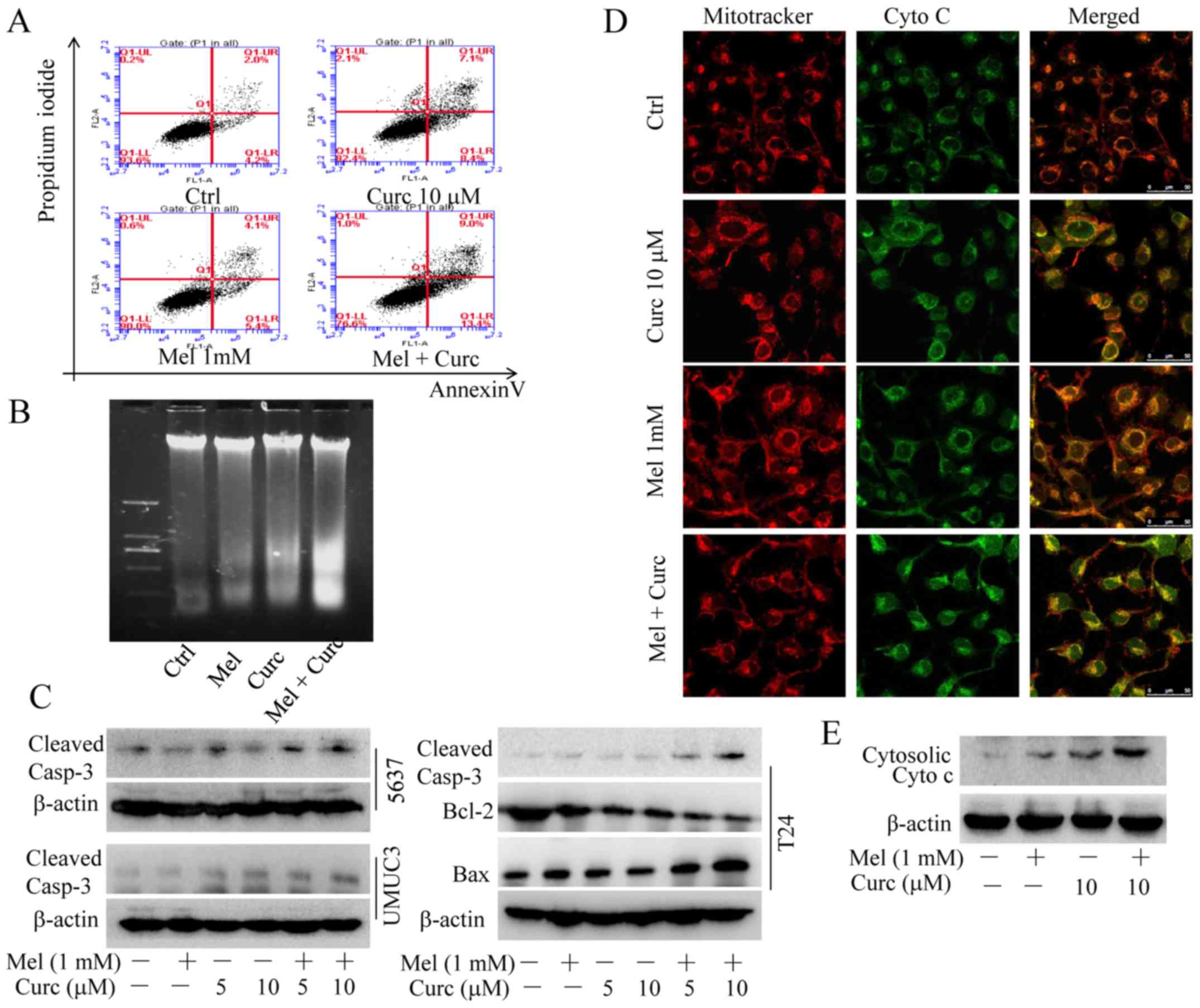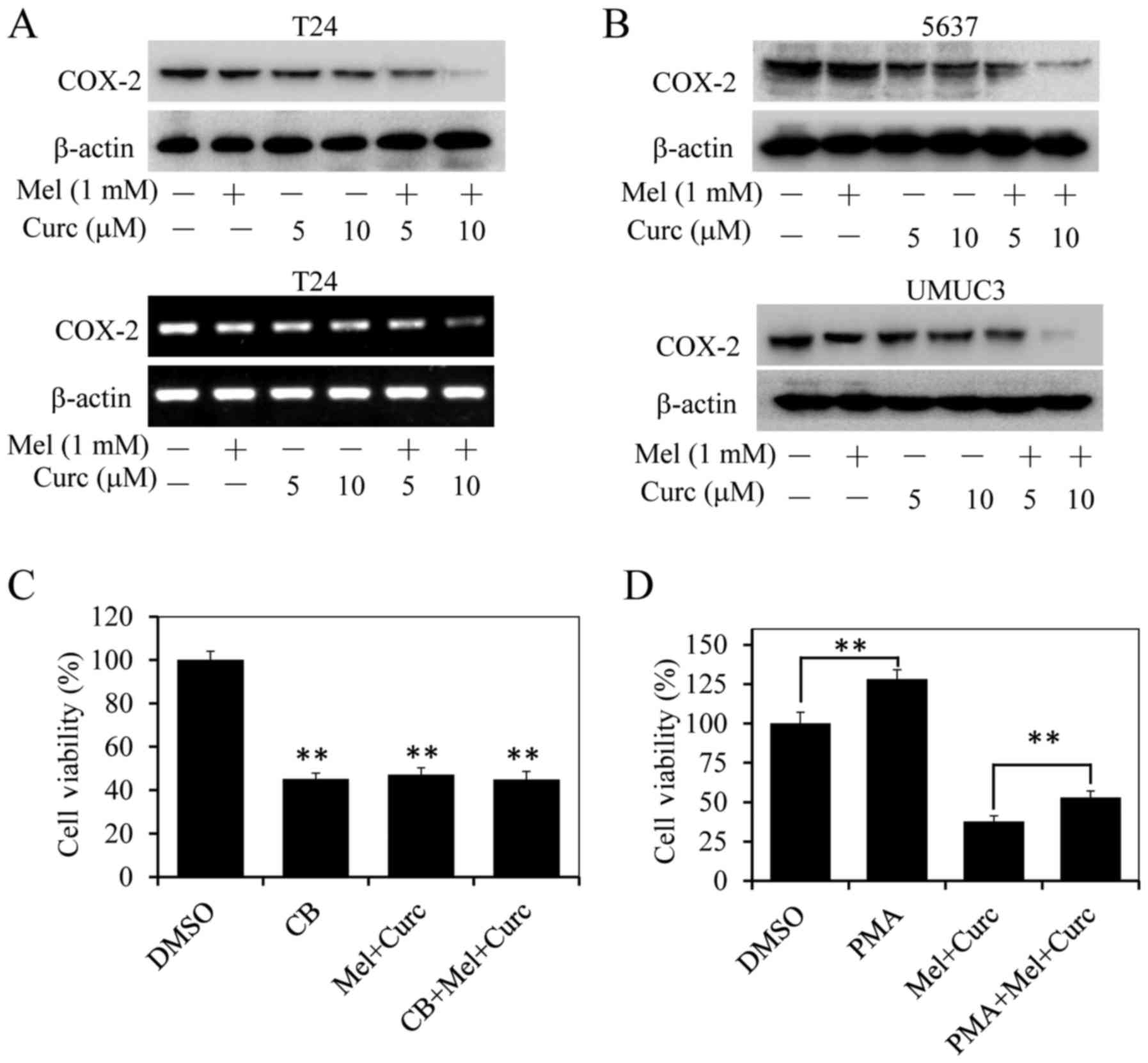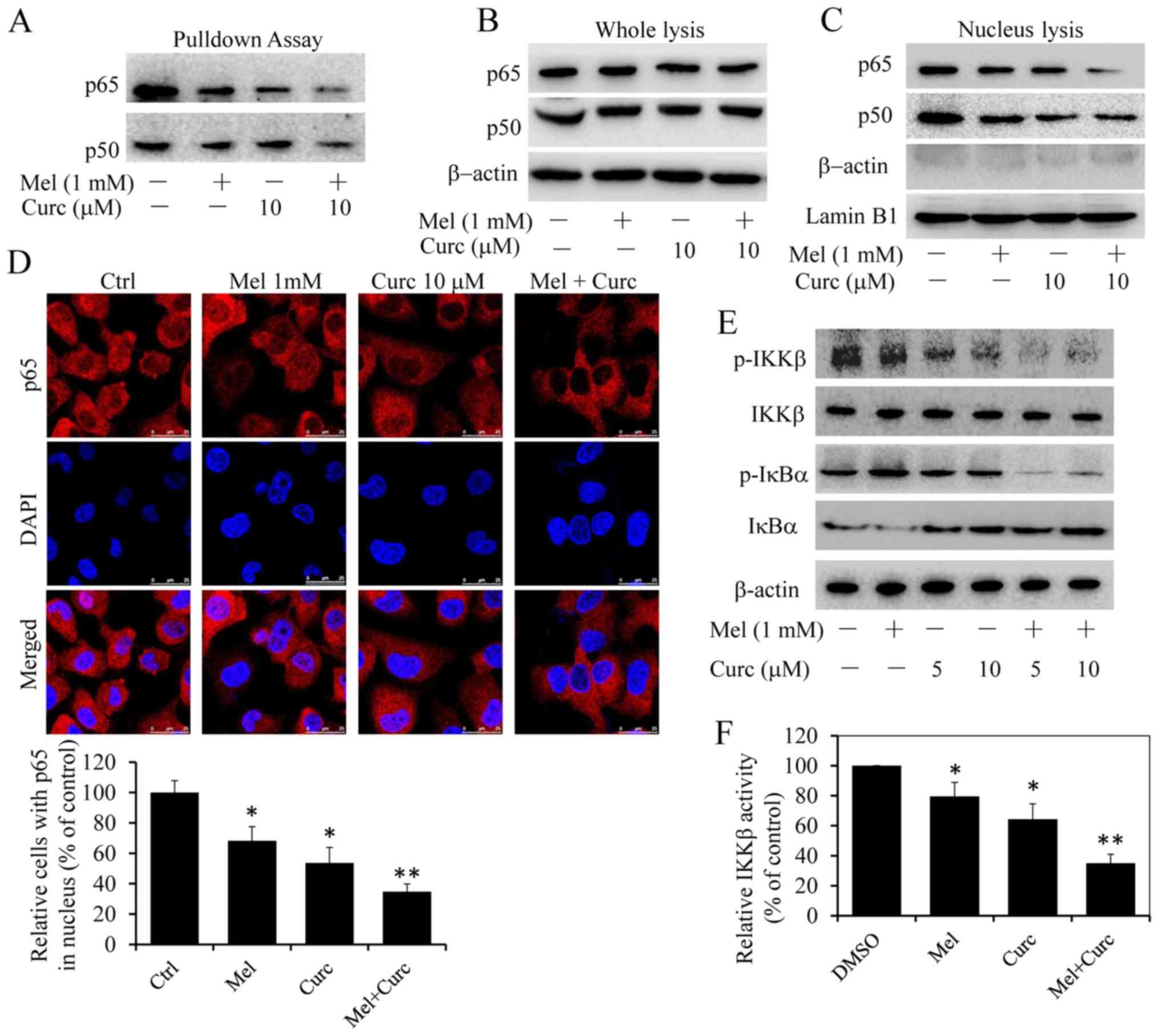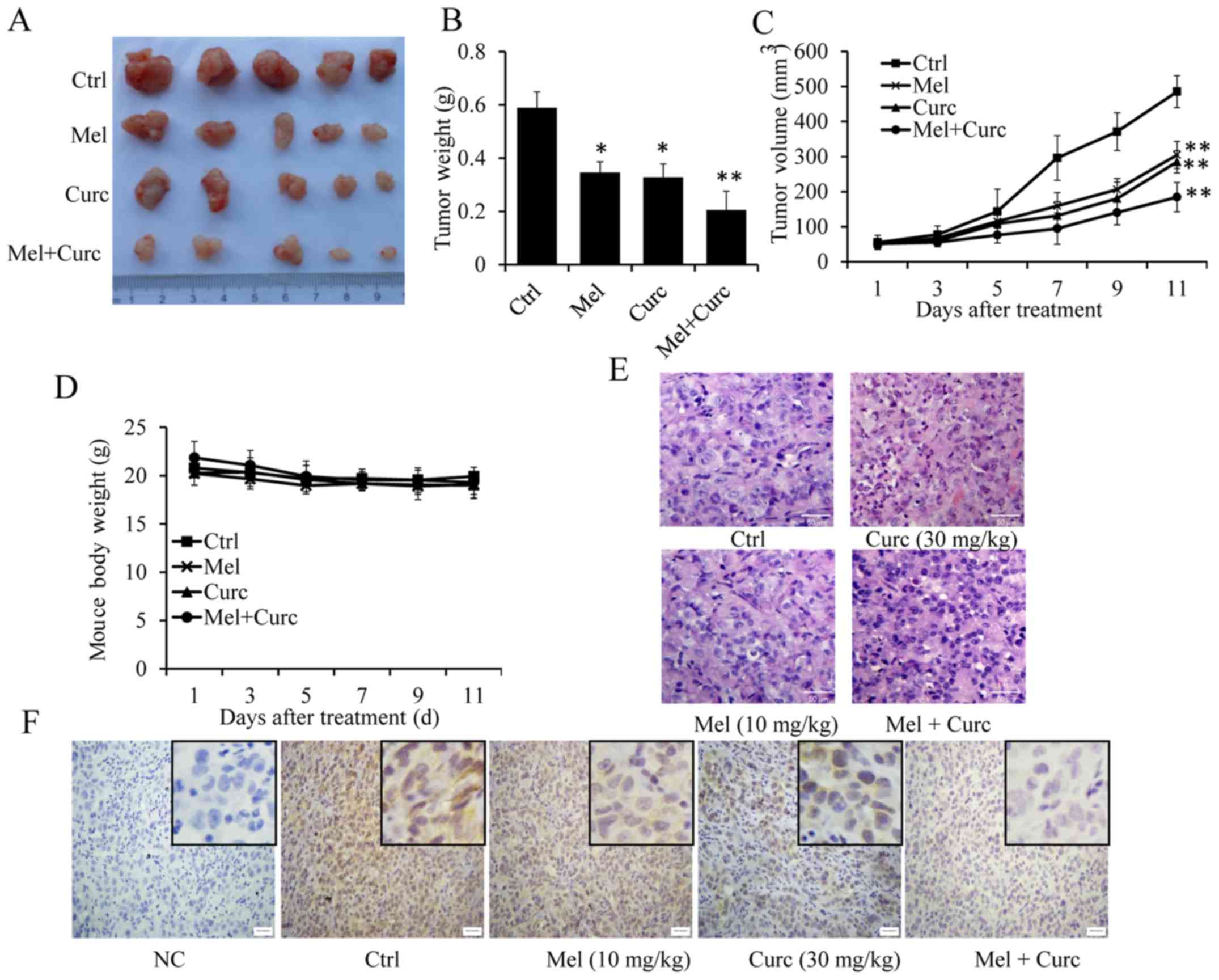|
1
|
Antoni S, Ferlay J, Soerjomataram I, Znaor
A, Jemal A and Bray F: Bladder cancer incidence and mortality: A
global overview and recent trends. Eur Urol. 71:96–108. 2017.
View Article : Google Scholar
|
|
2
|
Witjes JA: Bladder cancer in 2015:
Improving indication, technique and outcome of radical cystectomy.
Nat Rev Urol. 13:74–76. 2016. View Article : Google Scholar
|
|
3
|
Bellmunt J and Guix M: New agents for
bladder cancer. Ann Oncol. 21(Suppl 7): vii56–vii58. 2010.
View Article : Google Scholar : PubMed/NCBI
|
|
4
|
Anghel RM, Gales LN and Trifanescu OG:
Outcome of urinary bladder cancer after combined therapies. J Med
Life. 9:95–100. 2016.PubMed/NCBI
|
|
5
|
Shishodia S, Chaturvedi MM and Aggarwal
BB: Role of curcumin in cancer therapy. Curr Probl Cancer.
31:243–305. 2007. View Article : Google Scholar : PubMed/NCBI
|
|
6
|
Gupta SC, Kismali G and Aggarwal BB:
Curcumin, a component of turmeric: From farm to pharmacy.
Biofactors. 39:2–13. 2013. View Article : Google Scholar : PubMed/NCBI
|
|
7
|
Shehzad A and Lee YS: Curcumin: Multiple
molecular targets mediate multiple pharmacological actions - A
review. Drugs Future. 35:113–119. 2010. View Article : Google Scholar
|
|
8
|
Basile V, Ferrari E, Lazzari S, Belluti S,
Pignedoli F and Imbriano C: Curcumin derivatives: Molecular basis
of their anti-cancer activity. Biochem Pharmacol. 78:1305–1315.
2009. View Article : Google Scholar : PubMed/NCBI
|
|
9
|
Shehzad A, Wahid F and Lee YS: Curcumin in
cancer chemo-prevention: Molecular targets, pharmacokinetics,
bioavailability, and clinical trials. Arch Pharm (Weinheim).
343:489–499. 2010. View Article : Google Scholar
|
|
10
|
Gupta SC, Patchva S, Koh W and Aggarwal
BB: Discovery of curcumin, a component of golden spice, and its
miraculous biological activities. Clin Exp Pharmacol Physiol.
39:283–299. 2012. View Article : Google Scholar :
|
|
11
|
Chen J, He ZM, Wang FL, Zhang ZS, Liu XZ,
Zhai DD and Chen WD: Curcumin and its promise as an anticancer
drug: An analysis of its anticancer and antifungal effects in
cancer and associated complications from invasive fungal
infections. Eur J Pharmacol. 772:33–42. 2016. View Article : Google Scholar : PubMed/NCBI
|
|
12
|
Kasi PD, Tamilselvam R, Skalicka-Wozniak
K, Nabavi SF, Daglia M, Bishayee A, Pazoki-Toroudi H and Nabavi SM:
Molecular targets of curcumin for cancer therapy: An updated
review. Tumour Biol. 37:13017–13028. 2016. View Article : Google Scholar : PubMed/NCBI
|
|
13
|
Rahmani AH, Al Zohairy MA, Aly SM and Khan
MA: Curcumin: A potential candidate in prevention of cancer via
modulation of molecular pathways. BioMed Res Int. 2014:7616082014.
View Article : Google Scholar : PubMed/NCBI
|
|
14
|
Li Y and Zhang T: Targeting cancer stem
cells by curcumin and clinical applications. Cancer Lett.
346:197–205. 2014. View Article : Google Scholar : PubMed/NCBI
|
|
15
|
Tuorkey MJ: Curcumin a potent cancer
preventive agent: Mechanisms of cancer cell killing. Interv Med
Appl Sci. 6:139–146. 2014.
|
|
16
|
Kang M, Ho JN, Kook HR, Lee S, Oh JJ, Hong
SK, Lee SE and Byun SS: Theracurmin® efficiently
inhibits the growth of human prostate and bladder cancer cells via
induction of apoptotic cell death and cell cycle arrest. Oncol Rep.
35:1463–1472. 2016. View Article : Google Scholar : PubMed/NCBI
|
|
17
|
Liu HS, Ke CS, Cheng HC, Huang CY and Su
CL: Curcumin-induced mitotic spindle defect and cell cycle arrest
in human bladder cancer cells occurs partly through inhibition of
aurora A. Mol Pharmacol. 80:638–646. 2011. View Article : Google Scholar : PubMed/NCBI
|
|
18
|
Anand P, Kunnumakkara AB, Newman RA and
Aggarwal BB: Bioavailability of curcumin: Problems and promises.
Mol Pharm. 4:807–818. 2007. View Article : Google Scholar : PubMed/NCBI
|
|
19
|
McIsaac WM, Farrell G, Taborsky RG and
Taylor AN: Indole compounds: Isolation from pineal tissue. Science.
148:102–103. 1965. View Article : Google Scholar : PubMed/NCBI
|
|
20
|
Lerner AB, Case JD and Takahashi Y:
Isolation of melatonin and 5-methoxyindole-3-acetic acid from
bovine pineal glands. J Biol Chem. 235:1992–1997. 1960.PubMed/NCBI
|
|
21
|
Slominski RM, Reiter RJ,
Schlabritz-Loutsevitch N, Ostrom RS and Slominski AT: Melatonin
membrane receptors in peripheral tissues: Distribution and
functions. Mol Cell Endocrinol. 351:152–166. 2012. View Article : Google Scholar : PubMed/NCBI
|
|
22
|
Singh M and Jadhav HR: Melatonin:
Functions and ligands. Drug Discov Today. 19:1410–1418. 2014.
View Article : Google Scholar : PubMed/NCBI
|
|
23
|
Rondanelli M, Faliva MA, Perna S and
Antoniello N: Update on the role of melatonin in the prevention of
cancer tumorigenesis and in the management of cancer correlates,
such as sleep-wake and mood disturbances: Review and remarks. Aging
Clin Exp Res. 25:499–510. 2013. View Article : Google Scholar : PubMed/NCBI
|
|
24
|
García JJ, López-Pingarrón L,
Almeida-Souza P, Tres A, Escudero P, García-Gil FA, Tan DX, Reiter
RJ, Ramírez JM and Bernal-Pérez M: Protective effects of melatonin
in reducing oxidative stress and in preserving the fluidity of
biological membranes: A review. J Pineal Res. 56:225–237. 2014.
View Article : Google Scholar : PubMed/NCBI
|
|
25
|
Xin Z, Jiang S, Jiang P, Yan X, Fan C, Di
S, Wu G, Yang Y, Reiter RJ and Ji G: Melatonin as a treatment for
gastrointestinal cancer: A review. J Pineal Res. 58:375–387. 2015.
View Article : Google Scholar : PubMed/NCBI
|
|
26
|
Hill SM, Belancio VP, Dauchy RT, Xiang S,
Brimer S, Mao L, Hauch A, Lundberg PW, Summers W, Yuan L, et al:
Melatonin: An inhibitor of breast cancer. Endocr Relat Cancer.
22:R183–R204. 2015. View Article : Google Scholar : PubMed/NCBI
|
|
27
|
Ordoñez R, Carbajo-Pescador S,
Prieto-Dominguez N, García-Palomo A, González-Gallego J and Mauriz
JL: Inhibition of matrix metalloproteinase-9 and nuclear factor
kappa B contribute to melatonin prevention of motility and
invasiveness in HepG2 liver cancer cells. J Pineal Res. 56:20–30.
2014. View Article : Google Scholar
|
|
28
|
Marks F and Müller-Decker K: Fürstenberger
G. A causal relationship between unscheduled eicosanoid signaling
and tumor development: Cancer chemoprevention by inhibitors of
arachidonic acid metabolism. Toxicology. 153:11–26. 2000.
View Article : Google Scholar : PubMed/NCBI
|
|
29
|
Federico A, Morgillo F, Tuccillo C,
Ciardiello F and Loguercio C: Chronic inflammation and oxidative
stress in human carcinogenesis. Int J Cancer. 121:2381–2386. 2007.
View Article : Google Scholar : PubMed/NCBI
|
|
30
|
Nakanishi M and Rosenberg DW: Roles of
cPLA2alpha and arachidonic acid in cancer. Biochim Biophys Acta.
1761:1335–1343. 2006. View Article : Google Scholar : PubMed/NCBI
|
|
31
|
Wan GX, Chen P, Yu XJ, Di QS, Yu YD, Lei
JH, Tai YY and Cao FJ: Cyclooxygenase-2 polymorphisms and bladder
cancer risk: A meta-analysis based on case-control studies. Int J
Clin Exp Med. 8:3935–3945. 2015.PubMed/NCBI
|
|
32
|
Matsuo T, Miyata Y, Mitsunari K, Yasuda T,
Ohba K and Sakai H: Pathological significance and prognostic
implications of heme oxygenase 1 expression in non-muscle-invasive
bladder cancer: Correlation with cell proliferation, angiogenesis,
lymphangiogenesis and expression of VEGFs and COX-2. Oncol Lett.
13:275–280. 2017.PubMed/NCBI
|
|
33
|
Festa-Vasconcellos JS, Piranda DN, Amaral
LM, Indio-do-Brasil V, Koifman S and Vianna-Jorge R: Polymorphisms
in cycloxygenase-2 gene and breast cancer prognosis: Association
between PTGS2 haplotypes and histopathological features. Breast
Cancer Res Treat. 132:251–258. 2012. View Article : Google Scholar
|
|
34
|
Chen G, Li X, Yang J, Li J, Wang X, He J
and Huang Z: Prognostic significance of cyclooxygenase-2 expression
in patients with hepatocellular carcinoma: A meta-analysis. Arch
Med Sci. 12:1110–1117. 2016. View Article : Google Scholar : PubMed/NCBI
|
|
35
|
Park E-J, Cheenpracha S, Chang LC,
Kondratyuk TP and Pezzuto JM: Inhibition of
lipopolysaccharide-induced cyclooxygenase-2 and inducible nitric
oxide synthase expression by 4-[
(2′-O-acetyl-α-L-rhamnosyloxy)benzyl]isothiocyanate from Moringa
oleifera. Nutr Cancer. 63:971–982. 2011. View Article : Google Scholar
|
|
36
|
Asting AG, Carén H, Andersson M, Lönnroth
C, Lagerstedt K and Lundholm K: COX-2 gene expression in colon
cancer tissue related to regulating factors and promoter
methylation status. BMC Cancer. 11:2382011. View Article : Google Scholar : PubMed/NCBI
|
|
37
|
Jiang J and Dingledine R: Role of
prostaglandin receptor EP2 in the regulations of cancer cell
proliferation, invasion, and inflammation. J Pharmacol Exp Ther.
344:360–367. 2013. View Article : Google Scholar :
|
|
38
|
Jiang J and Dingledine R: Prostaglandin
receptor EP2 in the crosshairs of anti-inflammation, anti-cancer,
and neuroprotection. Trends Pharmacol Sci. 34:413–423. 2013.
View Article : Google Scholar : PubMed/NCBI
|
|
39
|
Zhang C, Su Z-Y, Wang L, Shu L, Yang Y,
Guo Y, Pung D, Bountra C and Kong AN: Epigenetic blockade of
neoplastic transformation by bromodomain and extra-terminal (BET)
domain protein inhibitor JQ-1. Biochem Pharmacol. 117:35–45. 2016.
View Article : Google Scholar : PubMed/NCBI
|
|
40
|
Yu ZL, Guo W, Ma XC, Zhang B, Dong P,
Huang L, Wang X, Wang C, Huo X, Yu W, et al: Gamabufotalin, a
bufadienolide compound from toad venom, suppresses COX-2 expression
through targeting IKKβ/NF-κB signaling pathway in lung cancer
cells. Mol Cancer. 13:2032014. View Article : Google Scholar
|
|
41
|
Karin M and Ben-Neriah Y: Phosphorylation
meets ubiquitination: The control of NF-[kappa]B activity. Annu Rev
Immunol. 18:621–663. 2000. View Article : Google Scholar
|
|
42
|
Bimonte S, Barbieri A, Leongito M,
Piccirillo M, Giudice A, Pivonello C, de Angelis C, Granata V,
Palaia R and Izzo F: Curcumin anticancer studies in pancreatic
cancer. Nutrients. 8:82016. View Article : Google Scholar
|
|
43
|
Charpentier MS, Whipple RA, Vitolo MI,
Boggs AE, Slovic J, Thompson KN, Bhandary L and Martin SS: Curcumin
targets breast cancer stem-like cells with microtentacles that
persist in mammospheres and promote reattachment. Cancer Res.
74:1250–1260. 2014. View Article : Google Scholar :
|
|
44
|
Bayet-Robert M, Kwiatkowski F, Leheurteur
M, Gachon F, Planchat E, Abrial C, Mouret-Reynier MA, Durando X,
Barthomeuf C and Chollet P: Phase I dose escalation trial of
docetaxel plus curcumin in patients with advanced and metastatic
breast cancer. Cancer Biol Ther. 9:8–14. 2010. View Article : Google Scholar
|
|
45
|
García-Rivera D, Delgado R, Bougarne N,
Haegeman G and Berghe WV: Gallic acid indanone and mangiferin
xanthone are strong determinants of immunosuppressive anti-tumour
effects of Mangifera indica L. bark in MDA-MB231 breast cancer
cells. Cancer Lett. 305:21–31. 2011. View Article : Google Scholar : PubMed/NCBI
|
|
46
|
Kim H-N, Kim D-H, Kim E-H, Lee MH, Kundu
JK, Na HK, Cha YN and Surh YJ: Sulforaphane inhibits phorbol
ester-stimulated IKK-NF-κB signaling and COX-2 expression in human
mammary epithelial cells by targeting NF-κB activating kinase and
ERK. Cancer Lett. 351:41–49. 2014. View Article : Google Scholar : PubMed/NCBI
|
|
47
|
Xia Y, Shen S and Verma IM: NF-κB, an
active player in human cancers. Cancer Immunol Res. 2:823–830.
2014. View Article : Google Scholar : PubMed/NCBI
|
|
48
|
Pittayapruek P, Meephansan J, Prapapan O,
Komine M and Ohtsuki M: Role of matrix metalloproteinases in
photoaging and photocarcinogenesis. Int J Mol Sci. 17:8682016.
View Article : Google Scholar :
|















